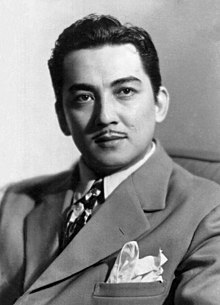Rogelio de la Rosa
| Rogelio de la Rosa | |
|---|---|
 |
|
| Senator of the Philippines | |
|
In office December 30, 1957 – December 29, 1963 |
|
| Personal details | |
| Born |
November 12, 1916 Lubao, Pampanga, Philippine Islands |
| Died | November 26, 1986 (aged 70) Manila, Philippines |
| Nationality | Filipino |
| Political party | Liberal Party |
| Spouse(s) | Lota Delgado |
| Occupation | Actor |
Regidor de la Rosa (November 12, 1916 – November 26, 1986), better known as Rogelio de la Rosa, was one of the most popular Filipino matinee idols of the 20th century. He is also remembered for his statesmanship, in particular his accomplishments as a diplomat. Elected to the Philippine Senate from 1957 to 1963, he also was the first Filipino film actor who was able to parlay his fame into a substantial political career, paving the way for other than future Filipino entertainers-turned-politicians such as Senators Eddie Ilarde, Ramon Revilla, Sr., Tito Sotto, Ramon "Bong" Revilla, Jr., Jinggoy Estrada, Lito Lapid, Freddie Webb, and President Joseph Estrada.
He was born in Lubao, Pampanga, the son of an arnis champion. Lubao was also the hometown of Diosdado Macapagal, four years his senior and a future political opponent and brother-in-law. Macapagal's first wife, Purita, was de la Rosa's sister. He has Spanish and Chinese ancestry.
While in high school, de la Rosa, along with Macapagal would regularly perform in zarzuelas as a villain.
As a teenager, he was cast by his uncle, a film director, in a starring role in the silent film Ligaw na Bulaklak opposite Rosa del Rosario. The film's director, José Nepomuceno, gave him the screen name "Rogelio de la Rosa". However, the young actor did not then engage in a regular film career, opting instead to attend college at the Far Eastern University in Manila. An excellent collegiate athlete and debater in the years from 1932-34. In 1933, de la Rosa won the Claro M. Recto Gold Medal in a national oratorical contest.
...
Wikipedia
